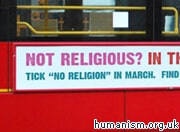The British Humanist Association’s advertising campaign at train stations and on buses for the 2011 Census later this month has faced a major setback.
The campaign, which was launched today, was due to have advertisements bearing the slogan: “If you’re not religious for God’s sake say so”.
But rail companies saw this as being of a “religious nature” and likely to offend and have banned the advertisements.
Unsuccessful
The British Humanist Association (BHA) attempted to reword their four-sheet placement in a variety of ways to the rail companies’ satisfaction, but they were unsuccessful.
The BHA reports on its website that the Advertising Standards Authority’s Committee of Advertising Practice advised it against using the wording “for God’s sake” in its adverts.
In light of this, the BHA’s media agency has agreed to modify its posters for buses only, which will read: “Not religious? In this year’s census say so”.
But the original leaflets and posters with the words “for God’s sake” still appear on the BHA’s Census Campaign website and visitors to the site are encouraged to download and use them in public places.
Wantonly inaccurate
The forthcoming census and the BHA’s campaign were featured on Radio 4’s Sunday programme this week.
Speaking on the programme, BHA chief executive Andrew Copson said the religion question in the census was “aberrantly imprecise” and “wantonly inaccurate.”
He said the results of the census would lead government, both nationally and locally, to make “wrong assumptions” based on “erroneous data” when allocating resources and developing policies.
But a Church of England spokesperson disagreed with his criticism.
Align
Revd Linda Barley, Head of the Church of England’s Research and Statistics Department, said of the religion question: “It’s not about belonging, it’s not about believing, it’s not about practice, or any of those things, it’s about just whether people feel they align themselves with different religious persuasions.”
She went on to say that the kind of more detailed information Andrew Copson was looking for would come from surveys like the British Social Attitudes Survey “to find out what it means on the ground.”
And her comments were backed by Peter Benton, Deputy Director of the 2011 Census.
Religious affiliation
“There are different concepts that you can measure in relation to religion”, he said, including religious practice, belief and affiliation.
“And when we’ve talked to the people that use the census data”, he added, “the one that matters most to them is religious affiliation”.
He concluded: “we could have chosen to measure some of the narrower aspects but it was a deliberate decision not to.”
Revd Linda Barley added that to see whether responses to “the same question” have “gone up or down or remained the same over the last ten years is hugely helpful” to those who will use the data.
Mountain
In its attempt to have British citizens declare themselves non-religious, the BHA has a mountain to climb.
According to the last census, for every one atheist/humanist in England and Wales there were 2,037 people who identified themselves as Christian.
The number of atheists and humanists in the 2001 Census in England and Wales was only 18,654, while those who said they were Christian in England and Wales numbered 38 million – 71 per cent of the population.
Last year the Integrated Household Survey, prepared for the Office of National Statistics, analysed the responses of almost 450,000 adults and revealed that 71.4 per cent of the population identify themselves as Christians, a figure similar to the 2001 census data.

